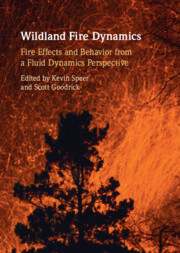Book contents
- Wildland Fire Dynamics
- Wildland Fire Dynamics
- Copyright page
- Contents
- Contributors
- 1 Wildland Fire Combustion Dynamics
- 2 The Structure of Line Fires at Flame Scale
- 3 Energy Transport and Measurements in Wildland and Prescribed Fires
- 4 Fire Line Geometry and Pyroconvective Dynamics
- 5 Firebrands
- 6 Re-envisioning Fire and Vegetation Feedbacks
- 7 Wind and Canopies
- 8 Coupled Fire–Atmosphere Model Evaluation and Challenges
- Index
- References
1 - Wildland Fire Combustion Dynamics
The Intersection of Combustion Chemistry and Fluid Dynamics
Published online by Cambridge University Press: 16 June 2022
- Wildland Fire Dynamics
- Wildland Fire Dynamics
- Copyright page
- Contents
- Contributors
- 1 Wildland Fire Combustion Dynamics
- 2 The Structure of Line Fires at Flame Scale
- 3 Energy Transport and Measurements in Wildland and Prescribed Fires
- 4 Fire Line Geometry and Pyroconvective Dynamics
- 5 Firebrands
- 6 Re-envisioning Fire and Vegetation Feedbacks
- 7 Wind and Canopies
- 8 Coupled Fire–Atmosphere Model Evaluation and Challenges
- Index
- References
Summary
To “spread like wildfire” is a phrase used to describe something that propagates unexpectedly, rapidly, and incessantly. Much of the unpredictable behavior of a wildfire stems from processes including the heat released from the combustion zone (flames), the structure and condition of fuels, the wind field and turbulence driving the fire, and terrain. However, the chemical make-up of the biomass fuel that powers a wildfire also provides a source for the capricious nature of combustion and the behavior of wildfires. This chapter provides a brief overview of the chemistry of biomass fuels and the chemical processes by which such fuels combust and release the energy that enables the fire to become self-sustaining. It then looks in some detail at the mechanisms through which the combustion chemistry driving the heat release from the fuels is influenced by the environment surrounding the combustion zone. In the worst instances these mechanisms can result in fire behavior that causes widespread death and destruction often over a very short period of time. In the best instances they enable fire to be used as a reliable tool for reducing the hazard present in the wild landscapes of our countryside and surrounding our homes.
Keywords
- Type
- Chapter
- Information
- Wildland Fire DynamicsFire Effects and Behavior from a Fluid Dynamics Perspective, pp. 1 - 34Publisher: Cambridge University PressPrint publication year: 2022
References
- 2
- Cited by

